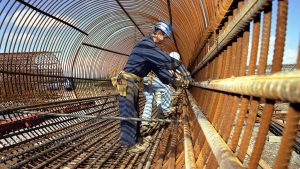Inspired by the results of a provincially arranged mediated session in the spring that resolved a number of rifts between trades, the Provincial Building and Construction Trades Council of Ontario is launching a new process aimed at forestalling disputes over trades’ jurisdiction.
Building Trades business manager Patrick Dillon explained a major aim of the process is to encourage council members to stop wasting money fighting trades disputes at the Ontario Labour Relations Board and instead to invest in building the trades up.
"We had some issues around the Ontario College of Trades in the past and we brought in a major respected facilitator to meet with all the trades, and I think they were amazed at how well they got along together," said Dillon, referring to a four-day facilitated session attended by representatives of compulsory and non-compulsory trades.
"I was looking at that and was thinking, you know what, we need to expand that. I think it is terrible that we wasted so much money at the labour board, and in some ways I find it disrespectful of our owner clients and so this is an attempt to be somewhat progressive, to have the family work as a family."
The new process was introduced via a resolution approved at the Building Trades annual convention held in Niagara Falls Oct. 11 to 13. The resolution, titled Mutual Respect of Each Other’s Core Jurisdiction, changes the council’s constitution and launches what Dillon admits will be an onerous new responsibility for the council.
"The fact is to progress you’ve got to work, and you’ve got to work on trying to deliver on an agenda that helps working people and everyone in our society," he said.
The resolution calls for a "working committee of Building Trades representatives from each affiliated union, engaging an industry-respected mediator/facilitator to determine the precise language of respect for each other’s core jurisdiction."
Jurisdictional agreements would be developed "to promote industrial peace among building and construction trades through mutual respect of each other’s core jurisdiction."
The preamble to the resolution indicated "Jurisdictional Disputes (JDs) between Building Trades unions cost members millions of dollars per year in legal and other fees, in addition to incalculable reputational damage," and added, "if those same resources were devoted to organizing and growing the number of represented workers in the construction industry, the collective voice of all construction workers would be much more formidable in our province’s political and economic life."
Commented Dillon, "We waste a lot of money unnecessarily at the labour relations board, and that is kind of the leadership that leads that, but the workers are the ones who pay. We have to be respectful of the ones we represent. If we can do it better, we need to do it better."
Six other conference resolutions out of 16 approved concerned health and safety.
Dillon took to a convention floor microphone to comment on one that identified employers’ "pretension prevention" as an issue, defined in a resolution introduction as being "about ‘proclaiming’ a commitment to safety through diligent bookkeeping and program implementation ‘without’ substantive improvements to actual health and safety practices and outcomes." The resolution called for the Building Trades to oppose the practice.
Other resolutions called on the Building Trades to lobby the federal government to allow workers who travel to work on infrastructure projects to be able to write off their travel and accommodation expenses on their tax returns; recommended the introduction of a national drug program; and called on the council to work with industry partners to promote new green jobs while ensuring that public investments in renewable energy infrastructure require "bona fide apprenticeship training that meets the highest standards of excellence and innovation."










Recent Comments
comments for this post are closed